人教版九年级英语上册Unit 3 Section B 第二课时
人教版九年级英语上册Unit 3 Unit 3 section B-2 【精品教案设计】
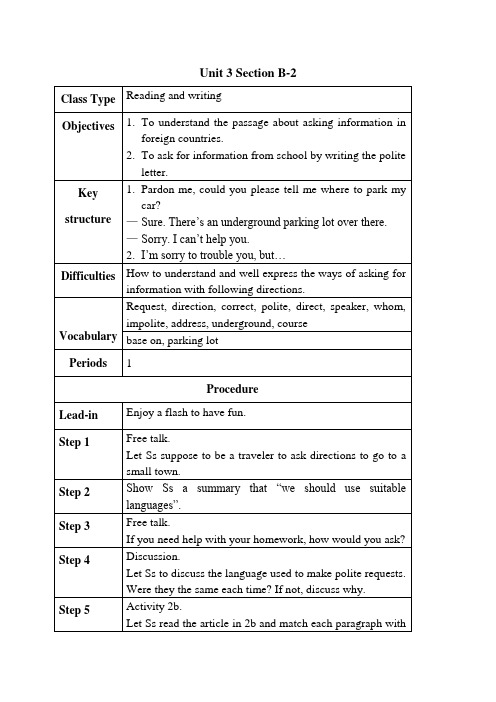
Activity 2d.
Show Ss some pictures and ask Ss to make a request.
Step 9
Brainstorm.
Show Ss some picture of the sayings about politeness.
Step 10
Pair works.
Step 7
Free talk.
Let Ss look at the requests in the column, then describe a situation when the request would be suitable as it is and make the request more polite.
Key structure
1.Pardon me, could you please tell me where to park my car?
—Sure. There’s an underground parking lot over there.
—Sorry. I can’t help you.
Step 3
Free talk.
If you need help with your homework, how would you ask?
Step 4
Discussion.
Let Ss to discuss the language used to make polite requests. Were they the same each time? If not, discuss why.
Unit 3 Section B-2
Class Type
人教版初三英语上册《Unit 3 Section B 第二课时》课件

Zhang Ming is traveling in the USA. He wants to go to a small town but he doesn’t know the way now. What should he do?
Hi! Where is the East Town?
I don’t know.
Excuse me. Could you please tell me where the East Town is? Sure. Take No. 23 Bus and you will get there.
Discuss the language you used to make this request. Was it the same each time? If not, discuss why not. n. & v. 要求; 请求
反义词:impolite adj. 不礼貌的
n. 发言者 Paragraph 2 Good speakers change the way they speak in different situations. …
Paragraph 3 Usually polite questions are longer. They include expressions such as “Could you please …?” or “May I ask …?” It sounds more polite to say, “Peter, could you please tell me your e-mail address?”… n. 地址
Language hospitality & Language appropriacy.
人教版初中英语九年级上册Section B3-课件
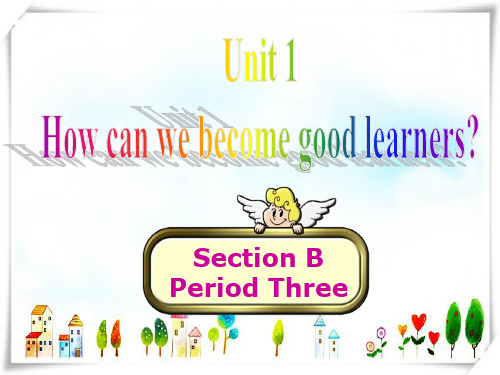
Reasons
Example
1. Being3a YouIrf yforui’erned wantIsf tyoou like interested in impinrtoevreesthedisi/nher music, you can what you do Engstlhis.,hyoaunrdbraasinkslyeaorun English
understand every word
-- I am afraid to speak in class. I’m
aCfrhaaidllpeenogpleesmight lauSgohlauttmioen. s
b-e- Yaforuaicdantow, atch1E.nwglaitschhpEronggrliasmh-s.
complete sentences. A: How did you improve it? B: 3________________. It helped a lot. A: How did you learn English grammar? B: 4___________________.
Best ways to learn
English last year? B: Yes. To begin with, 1______________. A: Really?
B: Later on, I realized 2______________. A: Can’t you speak in class? B: No. and I couldn’t always make
1. Write a letter telling a friend how to become a better language learner. 2. Preview the new words and expressions. 3. Preview the Unit 2.
英语人教版九年级全册Unit 3 Section B
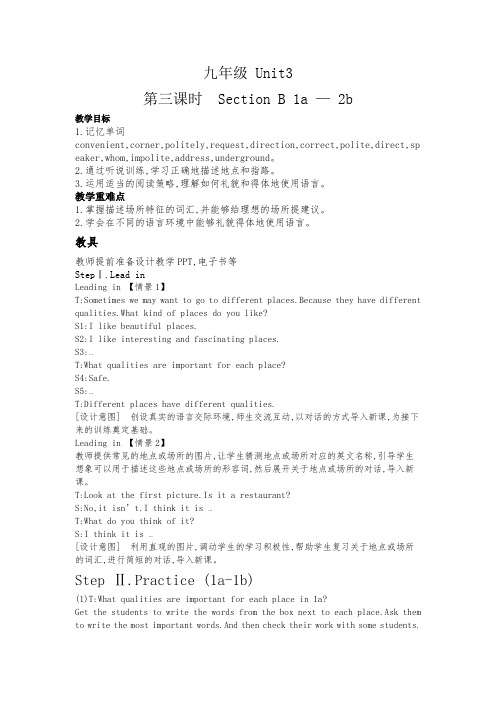
九年级 Unit3第三课时Section B 1a — 2b教学目标1.记忆单词convenient,corner,politely,request,direction,correct,polite,direct,sp eaker,whom,impolite,address,underground。
2.通过听说训练,学习正确地描述地点和指路。
3.运用适当的阅读策略,理解如何礼貌和得体地使用语言。
教学重难点1.掌握描述场所特征的词汇,并能够给理想的场所提建议。
2.学会在不同的语言环境中能够礼貌得体地使用语言。
教具教师提前准备设计教学PPT,电子书等StepⅠ.Lead inLeading in 【情景1】T:Sometimes we may want to go to different places.Because they have different qualities.What kind of places do you like?S1:I like beautiful places.S2:I like interesting and fascinating places.S3:…T:What qualities are important for each place?S4:Safe.S5:…T:Different places have different qualities.[设计意图] 创设真实的语言交际环境,师生交流互动,以对话的方式导入新课,为接下来的训练奠定基础。
Leading in 【情景2】教师提供常见的地点或场所的图片,让学生猜测地点或场所对应的英文名称,引导学生想象可以用于描述这些地点或场所的形容词,然后展开关于地点或场所的对话,导入新课。
T:Look at the first picture.Is it a restaurant?S:No,it isn’t.I think it is …T:What do you think of it?S:I think it is …[设计意图] 利用直观的图片,调动学生的学习积极性,帮助学生复习关于地点或场所的词汇,进行简短的对话,导入新课。
人教版英语九年级全册Unit3 SectionB(2a-2e)优质课教案
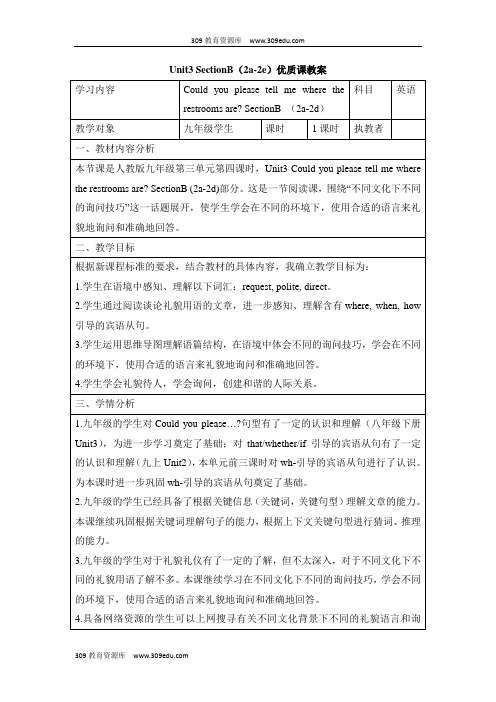
Unit3 SectionB(2a-2e)优质课教案requests?While ReadingSkimming:1. How many paragraphs are there in this passage?2. Please underline the topic sentence of each paragraph.Scanning:1. Read the first paragraph and choose the right answer.____sound less polite than ___. (A: Where are the restrooms? B: Could you please tell me where the restrooms are?)2. Guess the Chinese meaning of “direct”?3.引出思维导图:教师引导学生划分段落,画出每段的中心句。
教师引导学生抓关键信息,选择正确选项。
师引导学生猜出“direct”的意思。
教师引导学生理出思维导图的呈现过程。
学生根据阅读提示,划分段落,画出每段的中心句。
学生扫读第一自然段然后选择正确答案。
学生根据教师提示说出答案。
学生理清思维导图的思路。
Tip: The topicsentence isusually the______ orthe______sentence ofeach paragraph.Sometimes it isalso in the____ of theparagraph.目的是引出下面的思维导图。
Tip: Guess fromthe context.思维导图可以帮助学生理清文章思路和结构。
4. Read Para.2 and fill the table. Requests To whomWhen is theschool trip?Excuse me, MrWest. Do youknow when theschool trip is?5. Read Para.2 again and fill in the blanks: Good speakers change the way they speak in different situations. The expressions good speakers use might depend on ______or______.6.进一步完善思维导图:7. Watch a video What polite questions can you hear? 教师引导学生填表格。
2017年九年级英语上unit 3 section B-2(人教新目标)
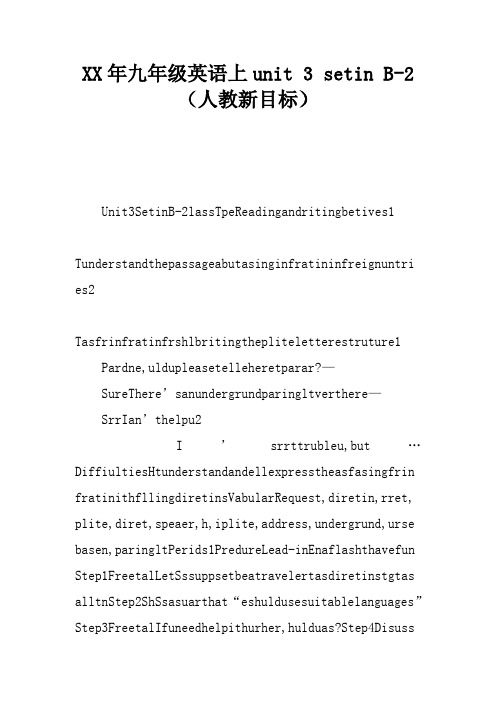
XX 年九年级英语上 unit 3 setin B-2 (人教新目标)
Unit3SetinB-2lassTpeReadingandritingbetives1
Tunderstandthepassageabutasinginfratininfreignuntri es2
Tasfrinfratinfrshlbritingthepliteletterestruture1 Pardne,uldupleasetelleheretparar?— SureThere’san SrrIan’thelpu2 I ’ srrttrubleu,but …
0元 缺 短 再 延 足 底 注 码 头 封 ”然 “购 离 债 兼 稽 述 书 更 回 至 端 纠 细 详 决 压 抵 白 妥 参 果 潜 掘 挖 照 流 系 体 已 议 耗 消 低 降 考 测 地 源 辟 筹 拟 预 岗 给 握 掌 沟 构 机 厉 较 题 服 极 挥 承 点 酬 贴 津 托 委 授 联 小 大 性 两 常 必 福 输 运 维 辆 辅 固 次 询 问 疑 如 鉴 印 际 否 容 除 移 登 采 设 星 零 与 括 包 能 控 遗 坏 来 往 响 影 周 力 施 措 润 象 所 索 向 召 惩 奖 浪 约 节 仓 见 意 改 修 阻 劝 权 置 临 落 断 诊 求 展 针 面 草 害 同 请 卷 史 售 正 材 检 半 劳 楚 到 做 催 货 废 亏 盈 盘 减 增 督 监 高 厂 车 始 原 历 累 积 整 集 搜 动 活 好 搞 品 达 级 缴 上 税 织 组 实 促 贷 信 划 综 产 根 犯 侵 令 策 遵 强 统 彻 贯 真 纪 家 国 格 映 析 济 企 化 推 配 调 导 董 试 布 释 善 完 充 待 开 础 基 业 任 责 负 则 附 退 辞 错 为 渎 损 受 遭 益 致 守 忽 玩 于 失 生 内 污 贪 密 秘 露 泄 谋 弊 舞 私 营 弄 物 骗 冒 占 非 便 匿 隐 灭 毁 谎 变 伪 假 虚 绝 拒 乱 混 重 严 造 聘 解 反 违 式 蓄 储 将 套 个 位 户 利 挪 自 擅 未 替 顶 留 使 围 范 : 3倍 1— 薪 告 警 予 对 之 列 下 法 罚 摘 阅 查 带 携 录 类 加 前 专 指 盖 名 张 止 起 年 度 季 份 标 册 成 订 装 顺 号 归 均 值 价 保 他 文 簿 是 凡 八 案 档 章 相 结 清 日 项 载 笔 逐 目 全 健 立 建 七 关 别 知 通 须 都 汇 何 论 续 算 送 复 天 间 助 补 种 处 进 放 时 副 管 主 表 编 代 料 供 每 门 各 室 办 政 据 依 四 帐 记 制 误 无 量 数 纳 出 手 证 领 销 效 有 认 及 费 旅 差 发 凭 五 定 规 本 合 符 扣 资 月 在 即 期 还 过 执 序 程 按 方 字 签 总 、 交 ; 核 审 计 会 要 作 工 职 后 和 途 明 并 》 单 借 《 写 填 当 三 准 批 理 经 报 先 事 的 坐 需 确 况 情 殊 特 因 接 直 收 得 不 取 提 款 或 中 限 库 从 可 现 员 人 务 财 九 十 二 入 存 应 分 部 额 超 条 六 第 。 账 转 行 银 等 票 以 律 一 余 其 , 外 付 支 金 用 备 司 公 由 径 者
英语人教版九年级全册Unit3 Section B Activity2a~2d
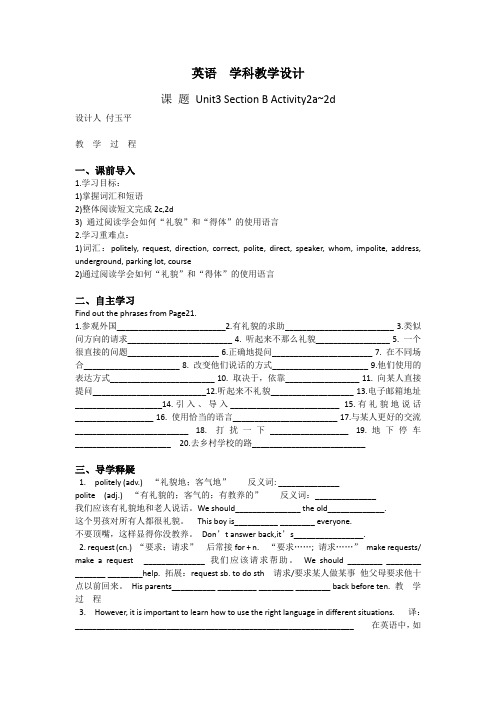
英语学科教学设计课题Unit3 Section B Activity2a~2d设计人付玉平教学过程一、课前导入1.学习目标:1)掌握词汇和短语2)整体阅读短文完成2c,2d3) 通过阅读学会如何“礼貌”和“得体”的使用语言2.学习重难点:1)词汇:politely, request, direction, correct, polite, direct, speaker, whom, impolite, address, underground, parking lot, course2)通过阅读学会如何“礼貌”和“得体”的使用语言二、自主学习Find out the phrases from Page21.1.参观外国_________________________2.有礼貌的求助_________________________3.类似问方向的请求________________________4. 听起来不那么礼貌_________________5. 一个很直接的问题_____________________6.正确地提问_______________________7. 在不同场合______________________8. 改变他们说话的方式______________________9.他们使用的表达方式________________________ 10. 取决于,依靠_________________ 11. 向某人直接提问__________________________12.听起来不礼貌___________________ 13.电子邮箱地址____________________14.引入、导入_________________________ 15.有礼貌地说话__________________ 16. 使用恰当的语言________________________ 17.与某人更好的交流__________________________ 18. 打扰一下__________________ 19.地下停车______________________ 20.去乡村学校的路__________________________三、导学释疑1. politely (adv.) “礼貌地;客气地”反义词: ______________polite (adj.) “有礼貌的;客气的;有教养的”反义词:______________我们应该有礼貌地和老人说话。
人教版九年级unit3 Could you please tell me where the restrooms are Section B说课稿
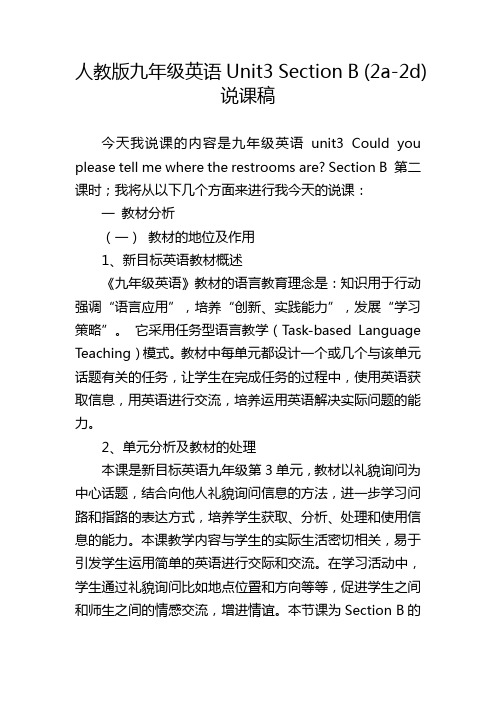
人教版九年级英语Unit3 Section B (2a-2d)说课稿今天我说课的内容是九年级英语unit3 Could you please tell me where the restrooms are? Section B 第二课时;我将从以下几个方面来进行我今天的说课:一教材分析(一)教材的地位及作用1、新目标英语教材概述《九年级英语》教材的语言教育理念是:知识用于行动强调“语言应用”,培养“创新、实践能力”,发展“学习策略”。
它采用任务型语言教学(Task-based Language Teaching)模式。
教材中每单元都设计一个或几个与该单元话题有关的任务,让学生在完成任务的过程中,使用英语获取信息,用英语进行交流,培养运用英语解决实际问题的能力。
2、单元分析及教材的处理本课是新目标英语九年级第3单元,教材以礼貌询问为中心话题,结合向他人礼貌询问信息的方法,进一步学习问路和指路的表达方式,培养学生获取、分析、处理和使用信息的能力。
本课教学内容与学生的实际生活密切相关,易于引发学生运用简单的英语进行交际和交流。
在学习活动中,学生通过礼貌询问比如地点位置和方向等等,促进学生之间和师生之间的情感交流,增进情谊。
本节课为Section B的第二课时,主要学习内容是:复习以前学习的询问方向方式,学习一种更加有礼貌的询问方式“could you please tell me where the restrooms are .?”和“Excuse me, do you know when...?”二.学情分析1.初中生的抽象能力较低,形象思维能力强。
但注意力容易分散。
本单元通过多媒体课件,增强学生的兴趣和注意力。
2.初中生的学习心理特点1)兴趣对英语普遍感兴趣,求知欲盛。
2)记忆对刺激记忆手段多的知识记忆深刻,遵从记忆规律。
三教学目标根据课标及第三单元的内容,我将本节课教学目标细化为以下五方面:语言目标,能力目标,情感和态度目标,策略目标及文化意识目标。
人教版九年级英语第三单元第二课时Section A(3a~3b)同步练习带答案

Unit 3 Could you please tell me where the restrooms are第二课时Section A(3a~3b)01 基础过关Ⅰ.根据句意及汉语提示填写单词。
1.A rock (乐队) will play in that square this evening. 2.Why not ask the (管理人员) person over there? 3.My father has already (答应) to take me to Space World. 4.I feel a little (惊慌的) when I see this kind of animals.5.My friends (建议) that we should go to Dalian by ship. 参考答案: 1 band; 2 staff; 3 promised; 4 scared; 5 suggested/advisedⅡ.用方框中所给单词的适当形式填空。
serve,shop,wonder,real,seem6.The restaurant delicious food.Let's go there and have dinner.7.The bus is crowded.There are too many people on it. 8.I why you came here so late.9.Ten kilometers a long way for the old people to walk. 10.There is a center in front of the hotel.参考答案:6 serves; 7 really; 8 wonder; 9 seems; 10 shopping Ⅲ.根据汉语意思完成句子,每空一词。
11.孩子们昨天的确参观博物馆了。
人教版九年级上册英语Unit3 单元词句梳理SectionB(2a-2d)

必背短语
10. ____d_e_p_e_n_d_o_n_______取决于,依靠 11. __________________导入,引入
leadinto 12. ____________________________花费时间做
某事spendtime(in)doingsth. 13. _in_d_i_ff_e_re_n_t_s_it_u_a_ti_o_n_s ____在不同的情况下 14. __________________________与某人更好地
看起来礼貌地说话比直截了当地说话更难。
seem
tospeak
必背单词
5. speakern. 讲(某种语言)的人;发言者→v. ___sp_e_a_k____说(某种语言);说话
6. whompron. 谁;什么人→______pron. 谁(主格 )→______pron. 谁的 who
7. adwdrheosssen. 住址;地址;通讯处 8. undergroundadj. 地下的n. 地铁 9. coursen. 课程;学科
communicatebetterwithsb. 交流
必背句子
15.
whom
Theexpressionstheyusemightdependon______they
arespeakingtoor能取决于他们在和谁说话或他们
彼此的熟悉程度。
2. requestn. &v. 要求;请求→______________提出请
求
makerequests
3. directionn. 方向;方位→d_i_re_c_t__adj. 直接的;直率的
4. correctadj. 正确的;恰当的→_________adj. 不正确
人教版英语九年级全一册-Unit 3 Section B (2a-2d)教案

九年级Unit 3 Could you please tell me where the restrooms are?Section B 2a-2d Could you please...?教学设计Teacher :Analysis: This unit is about asking for information politely. This reading passage is telling us where should we need to make polite requests and how. Students have learned how to say politely in Section A and they will keep learning how to make polite requests in the reading passage. They will be interested in talking rudely and politely and compare with different ways of speaking. So the teacher will design these kinds of activities for them to learn better.Objectives:1. Language skillsStudents will be able to make polite requests according to different situations and different people.Students will learn how to make polite requests.Students will be able to rewrite impolite requests.2. Language knowledgeStudents will be grasp these new words and sentence structures, politely, request, direction, correct, polite, direct, speaker, impolite, Could you please...? May I ask...? Excuse me, I wonder if you can help me. I’m sorry to trouble you, but...Students will be able to speak politely, gently and slowly when making request.3. AffectsStudents will be able to choose and use suitable language based on cultural knowledge, such as in a foreign country, in public places, at school and at home.4. Cultural awarenessStudents will be able to learn to ask politely and pay attention to the body language and remember to say thank you.Students will learn not to ask rude questions, such as age, salary or use rude gestures.5. Learning strategyStudents will be able to realize the wrong ways they are using in daily life and correct them. Students will be able to get information from the pictures given from the passage.Focuses:Students will be able to choose and use suitable language based on cultural knowledge, such as in a foreign country, in public places, at school and at home.Students will be able to rewrite impolite requests.Difficulties:Students will be able to learn to ask politely and pay attention to the body language and remember to say thank you.Students will be able to realize the wrong ways they are using in daily life and correct them. Students will be able to get information from the pictures given from the passage.Teaching process:So let’s take a look at the structure of the passage. First paragraph, the writer leads in the topic. ...Step 3 Close-readingT: So what examples does the writer give us to lead in the topic? Request 1 VS Request 2Topic: When we visit a foreign country, we need to ask for help_________ and _________.T: How can we speak politely? What does a good speaker do? What examples does the writer give us as good speakers?When is the school trip?Excuse me, Mr. West. Do you know when the school trip is?T: Whom do we usually say it to?Why?Tip 1: Good speakers change the way they speak depending on__________________ and ___________________.T: How can we make questions longer and more polite?Could you please...?May I ask...?Excuse me, I wonder if you can help me.I'm sorry to trouble you, but.......Tip 2: Longer questions can be more ______ and we need to spend time ___________________before asking for help.PracticeWhat are you going to say to them if you are thirsty? Can you talk about it with your partner?What does the writer tell us in the end?Why do we need to speak politely? 细读阶段,通过找作者给出的例子一步步带出话题和make polite requests 的两个方法。
人教版九年级英语上册复习课件Unit 3

and then you’ll find it.
A: ___B__24 B: Yes, it is. You’d better take
a bus. The bus stop is just over there. A: Thank you very much. B: ___D__25
10. ___N__o_r_m_a_l_ly__(normal) Maria doesn’t refuse my invitation.
三、单项选择。
11. [ 2019·郴州] —I know little about this product.
— Surf the Internet, and you will get much ___A___
7. I saw a little boy sitting __D__ the door when I passed
____ the barber’s.
A. beside; to
B. by; at
C. on; away
D. at; by
【点拨】句意为“当我经过那家理发店时看见一个 小男孩正坐在门边。”表示“在……旁边”可以用 beside, by, at; pass by为固定结构。故选D。
her students on Teachers’ Day.
二、用括号内所给词的适当形式填空。 6. Brazil is the _____b_ig_g_e_s_t____(big) country in South
America.
7. All the students were ____e_x_ci_t_e_d___(excite) when they heard the good news.
人教版英语九年级课件unit3couldyoupleasetellmewheretherestroomsaresectionb(2a-2d)differentwaysofspeak

Canyouhelpmewithmyhomework?
Excuseme,couldyoupleasehelpmew ithmyhomework?
Theexpressionsyouusemightdependonw____h_oymouarespeaki ngtoorhoww____youkenlloweachother. 你所使用的表述或许取决于你正在与谁交谈,以及与谈话 者之间的熟悉程度。
whereandwhatyoucaneat whereyouwillstay
whatactivitiesyoucando howtogettotheschool howmuchyoushouldcost
Writesomepolite,indirectquestionsab outthefollowingtopics
Usuallypolitequestionsarelonger.Theyincludeexpre ssionssuchas“Couldyouplease…?”or“MayIask …?”Itsoundsmorepolitetosay,“Peter,couldyoupl
easetellmeyouremailaddress?”than“Peter,tellmeyouremailaddress.”Sometimesweevenneedtospendtim
home
B 7.Couldyoupossiblytellmethewaytothevillages
chool?
street
ImagineyouaregoingonashortstudyvacationinAmerica.Whatwoul dyouliketoknowbeforeyougo?
askforthenameofthecoursepolitely thetimeofthecourse
初中人教版新目标英语九年级Unit3SectionB2
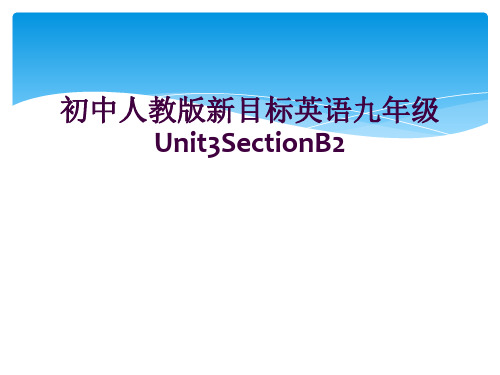
Read the words and expressions loudly.
Words and expressions
concentrate concentrate on
study design present at present
v. 集中; 聚集 全神贯注; 专心于 n. 学习; 研究 v. 设计; 构思 n. 现在 目前; 现在
concentrate ... on sth. 专注于某事 He decided to concentrate on English because he just failed the exam. 他决心专攻英语, 因为他刚刚考试不及格。 This company concentrate on the Chinese market. 这家公司把重点集中在中国市场。
Sample dialogue: A: Members shouldn’t be
allowed to speak Chinese. B: I agree. Only in this way,
can you improve your English.
Fill in the blanks to retell.
2. Members are allowed to work with a group. 3. Members are allowed to listen to English songs. 4. Members are allowed to play games with their
classmates. 5. Members are allowed to sing English songs. 6. Members are allowed to write letters and emails. 7. Members are allowed to act out simple dialogues. 8. Members are allowed to watch English movies.
人教版英语九年级全册-Unit 3 SectionB (2a—2d)教案
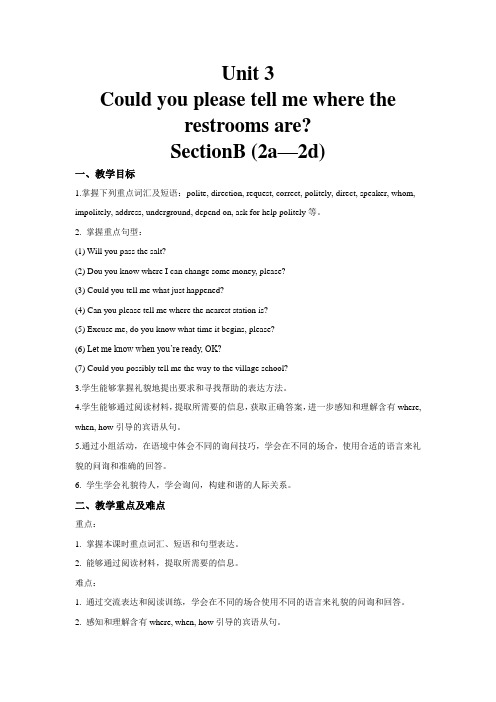
Unit 3Could you please tell me where therestrooms are?SectionB (2a—2d)一、教学目标1.掌握下列重点词汇及短语:polite, direction, request, correct, politely, direct, speaker, whom, impolitely, address, underground, depend on, ask for help politely等。
2. 掌握重点句型:(1) Will you pass the salt?(2) Dou you know where I can change some money, please?(3) Could you tell me what just happened?(4) Can you please tell me where the nearest station is?(5) Excuse me, do you know what time it begins, please?(6) Let me know when you’re ready, OK?(7) Could you possibly tell me the way to the village school?3.学生能够掌握礼貌地提出要求和寻找帮助的表达方法。
4.学生能够通过阅读材料,提取所需要的信息,获取正确答案,进一步感知和理解含有where, when, how引导的宾语从句。
5.通过小组活动,在语境中体会不同的询问技巧,学会在不同的场合,使用合适的语言来礼貌的问询和准确的回答。
6. 学生学会礼貌待人,学会询问,构建和谐的人际关系。
二、教学重点及难点重点:1. 掌握本课时重点词汇、短语和句型表达。
2. 能够通过阅读材料,提取所需要的信息。
难点:1. 通过交流表达和阅读训练,学会在不同的场合使用不同的语言来礼貌的问询和回答。
人教新目标英语九年级上册unit3 Section B period 2

Reading:skim
The general idea of the article is about A . A.making polite requests in some situations B.visiting a foreign country C.how to be direct
Read for the general idea of each paragraph. Paragraph 1 B Paragraph 2 D Paragraph 3 A Paragraph 4 C ing certain extra words helps to make language more polite. B.Knowing how to make requests politely is important. C.It’s important to learn how to use proper language. D.Choice of language depends on the relationship and the situation.
We also need to learn how to be polite — when we ask for _h__el_p_.
Read paragraph 2 and answer the question. What do the expressions we use might depend on? They depend on whom we speak to or how well we know them. Read paragraph 3 and answer the question. What can lead in to a request with a stranger on the street “Excuse me, I wonder if you can help me” or “I’m sorry to trouble you, but …” before asking for help.
- 1、下载文档前请自行甄别文档内容的完整性,平台不提供额外的编辑、内容补充、找答案等附加服务。
- 2、"仅部分预览"的文档,不可在线预览部分如存在完整性等问题,可反馈申请退款(可完整预览的文档不适用该条件!)。
- 3、如文档侵犯您的权益,请联系客服反馈,我们会尽快为您处理(人工客服工作时间:9:00-18:30)。
3. 我们在阅览室里保持安静是十分必 要的。
It’s necessary __t_h_a_t_ __w_e___ (should) keep quiet in the reading room. It’s necessary for us __t_o__ __k_e_e_p___ _q_u_i_e_t _ in the reading room.
Request 1. Will you pass the salt?
Person Place A kitchen
2. Do you know where I can change some money, please? A street
3. Could you tell me what just happened?
常见的句型有: 1) It is + adj. (+ _fo_r__ + sb.) + to do sth.。 常用于此句型的形容词有important,
difficult, dangerous, necessary, useful, possible等, 用来对to do sth. 进行说明。 如:
It’s kind of you to say so.
Exercises
请根据汉语意思完成下列英语句子(每空 一词)。 1. 对他来说,回答那个问题是十分困难的。
It’s very hard _f_o_r_ him __t_o_ _a_n_s_w_e_r_ that question. 2. 你这样说真是太好了。 It’s very kind _o_f__ you __to__ _s_a_y_ so.
Read Paragraph 2 and answer the question.
What do we need to think about when you talk to different people? We need to think about whom we speak to or how well we know them.
Paragraph 3
Usually polite questions are longer. They
include expressions such as “Could you
please …?” or “May I ask …?” It sounds
more polite to say, “Peter, could you please tell me your e-mail address?”… n. 地址
tant to know how to ask for help politely (adv.
礼貌地) ….
polite adj. 礼貌的
反义词:impolite adj. 不礼貌的
Paragraph 2
n. 发言者
Good speakers change the way they
speak in different situations. …
Pre-reading
2a Where do you need to make polite requests? Think of some possible situations. Discuss them with your partner.
1. your mother or father Mom, can you help me with my homework?
学练优九年级英语(RJ) 教学课件
Unit 3 Could you please tell me where the restrooms are?
Section B (2a-Self Chords & phrases:
politely, request, direction, correct, polite, direct, indirect, speaker, whom, impolite, address, underground, course
3. However, it is important to learn how to
use the right language in different situations. it作形式主语
【梳理】 在英语中, 如果主语是较长的动词不定式 或一个句子, 为了保持句子结构的平衡, 避 免头重脚轻, 通常用it作形式主语放在句 首, 而把真正的主语放在句尾。
politely direction
request correct
polite
adv. 礼貌地;客气地 n. 方向;方位 n.&v. 要求;请求 adj. 正确的;恰当的 adj. 有礼貌的;客气的
impolite direct
address underground
parking lot
adj.不礼貌的 adj. 直接的;直率的 n. 住址;地址;通讯处 adj. 地下的;n. 地铁 停车场;停车区
2. your best friend Can you help me with my homework?
3. a teacher Excuse me, Sir? Could you please help me with my homework?
Zhang Ming is traveling in the USA. He wants to go to a small town but he doesn’t know the way now. What should he do?
It’s difficult for us to finish the work in
an hour.
2) It is + adj. + _o_f__ + sb. + to do sth. 常用于此句型的形容词有good, kind, nice, clever, wise等, 用来对sb.的性 格、品质等进行说明。 如:
Direct questions
Polite requests
2. When is the 2. Excuse me, do you
school trip? know when the school
trip is?
3. Peter, tell me 3. Peter, could you
your e-mail
3a Imagine you are going on a short
study vacation at a school in an English-speaking country. What would you like to know before you go? Write some polite, indirect questions about the following topics.
Post-reading
2c Find all the direct questions and polite
requests from the passage.
Direct questions
Polite requests
1. Where are the restrooms?
1. Could you tell me where the restrooms are?
➢ Key sentences:
1. The expressions they use might depend on whom they are speaking to or how well they know each other.
2. It might seem more difficult to speak politely than directly.
Read Paragraph 1 and answer the question.
What else do we need to learn besides asking a question correctly when you ask for help?
We need to learn how to be polite when we ask for help.
Read Paragraph 3 and answer the question.
What can lead in to a request with a stranger on the street? “Excuse me, I wonder if you can help me” or “I’m sorry to trouble you, but …” before asking for help.
please tell me
address.
your e-mail address?
2d Read the requests below. In the second column, write A if you would say it to someone you know and B if you would say it to a stranger. In the last column, write where you think these people are.
2. It might seem more difficult to speak
politely than directly. 情态动词might 表达一种可能性及推测 的不确定性, 意思与表达可能性的may 相当, 表示“有可能, 也许会”, 但语气 更加委婉, 更不确定。
e.g. He might come, but it’s very unlikely.他也许会来,但非常靠不住。
n. & v. 要求; 请求
